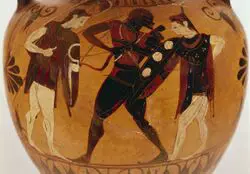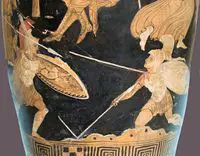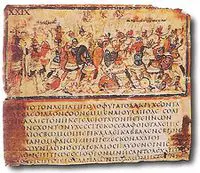Who was Memnon the African hero in Greek Mythology
There are many extraordinary characters and events in Greek and Roman mythology. One of the most remarkable figures of Classical Mythology is Memnon, an African hero. He played a crucial role in the Trojan War and was regarded by the Greeks and others as one of the greatest heroes and demi-gods. Indeed, he almost turned the tide of the Trojan War, and such was his prowess and bravery.
Memnon was a revered figure, and he inspired great works of literature and also art. The story of this African hero provides a crucial insight into the worldview of the Ancient World. It demonstrates that they were often more tolerant when it came to race and saw all people as inherently equal. The story of Memnon needs to be better known and understood in today's very divided world.
The historicity of the Ethiopian Hero
Like many mythical heroes, the character of Memnon may have been based on a historical hero. This is a phenomenon that has occurred many times in the past and across all cultures. Some academics believe that the Ethiopian hero was based on a Pharaoh. It is possible that the fabled hero was inspired by one of the Nubian monarchs who conquered Egypt [1]. They established the Kushite dynasty and ruled a vast empire of modern Egypt, North and South Sudan (744–656 BC). Some academics argue that the figure of Memnon is based on the great Egyptian King Amenhotep III (1381-1355 BC), often known as the Magnificent, because of his achievements. This was the view of the Egyptian historian Manetho. However, some believe that the hero was based on the mighty ruler Seti I (1294-1279 BC)[2]
Memnon's death is related at length in the lost epic Aethiopis, composed after The Iliad circa the 7th century B.C. When the Romans, under Augustus, added Egypt to their Empire, they believed that the statues of Amenhotep were representations of Memnon. One of the statues was the famous Colossi of Memnon. This supposedly made sounds when it was struck by the rising sun's first light and was one of the wonders of the Classical World[3]. Another possibility is that the character was based on an unknown African king, whose name has not been recorded by history. Still, the Greeks were made aware of his achievements by tales spread by merchants and travelers.
Origin of Memnon
Memnon was the son of Tithonus, a prince of Troy, and his father was King Laomedon. Troy was a large city and capital of a powerful kingdom in what is today modern Turkey. His mother was the goddess Eos, a daughter of the Titan Hyperion [4]. Eos was the goddess of the Dawn, and she fell in love with Tithonus. She had been cursed by Aphrodite with an insatiable sexual desire and quickly fell in love. Eos took Tithonus with her to an area east of Ethiopia. This should not be confused with the modern Republic of that name.
Ethiopia in Classical Geography was a name given to the vast tract of lands south of Egypt. Eos gave birth to Memnon and later his brother Emathion. However, because of Aphrodite's curse, Eos had many other lovers, and as a result, Memnon had many half-siblings, including Phaeton. Several sources reference the African hero. Tragically, there are only fragments of an epic poem, the Aethiopis, written in the 7th or 6th century B.C., based on his life and death, which have survived. If this poem had survived, the story of Memnon would be better known, and he would be as famous as his great rival Achilles.
The rise of Memnon
Memnon was a great warrior from an early age. This was in part because he was a favorite of the gods. This was in part because of his mother Eos, but also because of his nobility of character. All his life was to receive many favors from the gods. Because of his bravery and his military skills, he became ruler of the Ethiopians. The Greeks regarded Ethiopia as a powerful kingdom and civilized, much more so than many of their European neighbors. In Homer, he is referred to as bronze-armed Memnon, which references his great strength and power. There are few details about the rise to power of this African hero. It seems that his brother, who had been King before him, was killed by the most significant Greek hero Hercules during one of his seven labors.
Memnon is in Greek and Roman art is shown as being African with dark skin and curly hair. Memnon was regarded as one of the most handsome of all men. There are several references to him as a conqueror, and it appears that he conquered many lands in what the sources refer to as the east. This is a reference to the fact that he waged wars in the modern Middle East. There are some accounts that he conquered Egypt and campaigned as far east as Persia. Memnon had all the virtues that the Ancients admired, and one of these was loyalty to his kin [5]. There are references in the Iliad to him maintaining close connections with his father's homeland and his relatives, the Trojan royal family. This ultimately led to him marrying a Trojan, Queen Troana Ilium, with a son known as Tror.
The Trojan War
The Trojan War was a 10-year battle between the Trojans and the Greeks over the abduction of Helen. When the great Greek hero, Achilles, killed Hector, the champion of the Trojans, it seemed as if their city would fall. Priam beseeched the gods to help him and his people. At this time, the Trojans were penned up in their town by a massive collation of armies under the command of Agamemnon [6]. Only the legendary strong walls of their city saved the Trojans from destruction. Priam, in his desperation, implored his nephew to come and help in defense of Troy.
The gods told Memnon of the plight of his kin, and he left Ethiopia with a large army to come to their aid. When the Ethiopian army arrived, they were forced to camp outside the walls because of their large numbers. In many accounts, the soldiers of Memnon were shown to be highly trained and worthy opponents of the Greeks. The African hero immediately attacked the Greeks<Cline, p 113</ref>. He is described as killing many of his uncle's enemies from his chariot. During one battle, he came face to face with Antilochus, a hero and the son of King Nestor.
In some accounts, this Greek warrior had killed the friend of Memnon, but in others, he was defending his father, Nestor. The two great warriors clashed in single combat. Memnon killed Antilochus after a long and hard-fought duel [7]. The African King had killed one of the greatest and most feared warriors in all of Greece. This changed everything, and the tide of war began to turn in favor of the Ethiopians and their Trojan allies. The army of Agamemnon soon came to dread the name of Memnon, and they were pushed back to the sea. Indeed they were prepared to leave Troy in their ships and return to their homeland. King Nestor challenged Memnon to a duel, but the Ethiopian refused because of the old age of the Greeks. In his grief, Nestor beseeched Achilles to intervene and avenge his dead son. Only he had the strength to fight with the Africans. Achilles, who, like the Ethiopian, was beloved by the gods.
However, when the Olympians saw that their two favorites would fight to the death, they agreed to stay neutral. Achilles and Memnon fought a long and grueling duel. Achilles was swift and agile. The Greek was able to thrust his spear through the shield of Memnon and drive it into his side. Then as the Ethiopian lay wounded, the Greek killed him with his sword [8]. The death of the great African warrior and King demoralized his army, and they retreated from the battlefield and returned to their homes. Some of his faithful men stayed to bury him and perform the necessary burial rites. In one myth, they buried the King in a tomb, and they were eventually turned into birds who would clear the dust from Memnon's tomb.
In another account, it is stated that the Gods, who were grieved over their favorite's death that to commemorate him, collected his blood and turned it into a river and it would turn red, to mark the anniversary of his death. However, in a later Hellenistic account, the King of the Olympians, Zeus, was so moved by the tears of the mother of Memnon that he made him immortal.
The importance of the Memnon myth
This myth is significant in Classical Mythology. Firstly, it shows that the Greeks were very aware of the world around them. It appears that they were mindful of the existence of powerful African kingdoms south of Egypt. Indeed, from the Hellenistic period forward, the Hellenistic kingdoms often traded directly with these Africans. However, the legend of Memnon predates these contacts' and this illustrates that the Greeks were aware of African societies at an early date. The story of Memnon also provides evidence that Africans played a part in the Classical World. It also helps to undermine the narrative that Africans have not played an essential role in history and the development of culture.
This myth depicts the Africans in a very positive light and as someone with the virtues revered by the Ancient Greeks and later the Romans. It shows that the Ancients had no set ideas about race, unlike the modern world [9].
They would have been baffled by the idea of dividing people into different races based on physical differences. This is not to say that they did not have strong ideas about ethnic identity and the Greeks saw themselves as culturally superior to barbarians. However, they did not categorize people into races. The respect that they had for Africans is evident in the story of Memnon and their high regard for him. This is also apparent in the Roman World. For example, Septimus Severus, the mighty Emperor, was born and bred in North Africa. The story of Memnon remained influential even after the collapse of the Classical World after the fall of the Western Roman Empire (476 AD). His story spread all over Europe, and in some accounts in Norse Mythology, Memnon is the father of the god Thor, who is now best known as a character from the Marvel franchise of comics and movies.
Conclusion
One of the reasons why we still are fascinated by Ancient myths is that they are great stories. We, humans, require stories and heroes. Memnon is one such hero, a great king, warrior, and noble. He was someone who almost changed the course of the most critical war in Classical mythology. However, like other myths, there is much to learn. In the story of the Ethiopian King, we have evidence that the Greeks were aware of Africa and that they played a part in Classical culture.
Of great relevance to the modern world is what the story tells us about concepts of race in the past. The myth of Memnon shows that the Greeks, as was also the case with the Romans, were not concerned with ideas about race and did not judge people based on these socially constructed categories. They would have been confused by the division of humans into groups based on physical traits.
Further Reading
Gardiner, A. (1961). The Egyptian Memnon. The Journal of Egyptian Archaeology, 47(1), 91-99. Graves, Robert (1990). The Greek Myths. London: Pelican.
References
- Jump up ↑ Griffith, R. D. The origin of Memnon. Classical Antiquity, 17(2) (1998). 212-234
- Jump up ↑ Griffith, R. Drew. "The origin of Memnon." Classical Antiquity 17, no. 2 (1998): 212-234
- Jump up ↑ Bowersock, Glen Warren. "The miracle of Memnon." The Bulletin of the American Society of Papyrologists 21, no. 1/4 (1984): 21-32
- Jump up ↑ Hesiod, Theogony 984
- Jump up ↑ Griffith, p. 221
- Jump up ↑ Cline, E. H. The Trojan War: A Very Short Introduction (Vol. 356) (Oxford, Oxford University Press, 1998)
- Jump up ↑ Homer, 17, 6
- Jump up ↑ Griffith, p. 227
- Jump up ↑ Kennedy, Rebecca F., C. Sydnor Roy, and Max L. Goldman. Race and ethnicity in the classical world: An anthology of primary sources in translation (London, Hackett Publishing, 2013)


